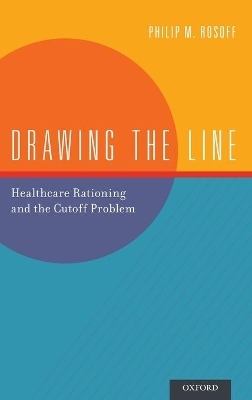
Drawing the Line
Healthcare Rationing and the Cutoff Problem
Seiten
2017
Oxford University Press Inc (Verlag)
978-0-19-020656-7 (ISBN)
Oxford University Press Inc (Verlag)
978-0-19-020656-7 (ISBN)
American healthcare is neither efficient nor available to all, and is also the most expensive in the world. This book argues that rationing of healthcare could work and proposes an approach to ration fairly, effectively and generously.
Unlike the rest of the advanced industrialized world, the United States does not have a national healthcare system that guarantees that all residents have access to medical services. Over the past century a number of unsuccessful attempts have been made to create and implement a unified, coordinated healthcare system. Piecemeal progress has been made, such as with the passage of Medicare, Medicaid, and the Affordable Care Act. However, the US still has the dubious distinction of possessing the most expensive healthcare in the world as well as health-related outcomes that are shameful for a wealthy country, mostly due to the number of people who lack decent care. The continuing escalation in medical costs is also threatening the financial stability of the nation.
In his first book, Rationing is Not a Four-Letter Word, Philip M. Rosoff argued that the only way to control costs is to impose rationing, and the only way to do so fairly is to have it apply to all. The key to rationing is how it is accomplished. He outlined a general approach to making rationing decisions that involved a comprehensive explication of procedural fairness and illustrated this with the real-life accepted system of solid organ allocation for transplantation. In this book, he discusses how to decide what should and should not be covered in a generous benefits plan for all. He considers a variety of ways this might be done and concludes that the most just approach is to utilize a transparent process in which experts and lay people develop a consensus on what should be covered by focusing on both clinical evidence of need and the effective and appropriate means to address those needs. He also considers the various objections and impediments to this proposal and concludes that they are obstacles that can be successfully met.
Unlike the rest of the advanced industrialized world, the United States does not have a national healthcare system that guarantees that all residents have access to medical services. Over the past century a number of unsuccessful attempts have been made to create and implement a unified, coordinated healthcare system. Piecemeal progress has been made, such as with the passage of Medicare, Medicaid, and the Affordable Care Act. However, the US still has the dubious distinction of possessing the most expensive healthcare in the world as well as health-related outcomes that are shameful for a wealthy country, mostly due to the number of people who lack decent care. The continuing escalation in medical costs is also threatening the financial stability of the nation.
In his first book, Rationing is Not a Four-Letter Word, Philip M. Rosoff argued that the only way to control costs is to impose rationing, and the only way to do so fairly is to have it apply to all. The key to rationing is how it is accomplished. He outlined a general approach to making rationing decisions that involved a comprehensive explication of procedural fairness and illustrated this with the real-life accepted system of solid organ allocation for transplantation. In this book, he discusses how to decide what should and should not be covered in a generous benefits plan for all. He considers a variety of ways this might be done and concludes that the most just approach is to utilize a transparent process in which experts and lay people develop a consensus on what should be covered by focusing on both clinical evidence of need and the effective and appropriate means to address those needs. He also considers the various objections and impediments to this proposal and concludes that they are obstacles that can be successfully met.
Dr. Philip M. Rosoff is Professor of Pediatrics and Medicine at Duke University Medical Center. He is a Resident Scholar of the School of Medicine's Trent Center for Bioethics, Humanities & History of Medicine. He chairs Duke Hospital's Ethics Committee. He has had a long-standing interest in the intersection between clinical ethics and healthcare policy, especially in the setting of scarce resources.
Preface
Chapter 1. The Problem
Chapter 2. Characteristics Used as Cutoff Points
Chapter 3. Needs, Wants, Preferences and Demands
Chapter 4. Prediction, Prognosis and Uncertainty
Chapter 5. Rules, Rescues and Miracles
Chapter 6. Luck
Chapter 7.Conclusions
Bibliography
Index
| Erscheinungsdatum | 04.12.2016 |
|---|---|
| Verlagsort | New York |
| Sprache | englisch |
| Maße | 234 x 163 mm |
| Gewicht | 587 g |
| Themenwelt | Medizin / Pharmazie ► Gesundheitswesen |
| Medizin / Pharmazie ► Medizinische Fachgebiete ► Medizinethik | |
| Studium ► 1. Studienabschnitt (Vorklinik) ► Med. Psychologie / Soziologie | |
| Studium ► Querschnittsbereiche ► Geschichte / Ethik der Medizin | |
| ISBN-10 | 0-19-020656-X / 019020656X |
| ISBN-13 | 978-0-19-020656-7 / 9780190206567 |
| Zustand | Neuware |
| Haben Sie eine Frage zum Produkt? |
Mehr entdecken
aus dem Bereich
aus dem Bereich


